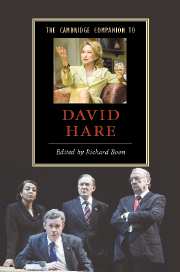11 - Hare on film
An interview
from Part III - Hare on screen
Published online by Cambridge University Press: 28 April 2008
Summary
Hare’s career on film effectively began with Wetherby in 1985, though, as John Bull points out in Chapter 10, 1983’s Saigon: Year of the Cat blurs somewhat the distinction between cinematic and television work. Hare wrote and directed Wetherby, as well as Paris by Night (1988) and Strapless (1988). Two other screenplays, Damage (1992) and The Hours (2002), were directed by Louis Malle and Stephen Daldry respectively. In addition, the author adapted two of his most successful stage plays for film: Plenty (1985; directed by Fred Schepisi) and The Secret Rapture (1993; directed by Howard Davies). The interview took place in Hampstead in January 2007.
I began by asking him about the relationship between his television and film work, and whether there was any significance in the fact that his attention turned so much to film in the mid-to-late 1980s.
What happened was that it became commercially possible for me to be a film director because of David Rose and Jeremy Isaacs and their patronage when they started Channel 4 in 1982. Isaacs was the Chief Executive, and Rose headed the film department. Their brief was that 'We're starting a new television channel and we want to make British films; we want to make films that look out toward British life, and which are contemporary.' I did it for as long as I could. More or less everything that was interesting on the screen in the 1970s was on television. It was not practical for us to make work for the cinema then, because there was no framework available: big British films - which were essentially aimed at the American market - had died. And then, quite simply, it was down to the genius of Isaacs and Rose, who set out to make a link between the distinguished tradition of British television plays and the cinema by nurturing writing and directing talent within the relative safety of television, then moving it on. My feeling has always been that the reason people left television was because of censorship. In the 1970s, problems of BBC censorship were very intense. The BBC was then run by establishment villains. So we all moved out to the cinema but, by and large, when I was making feature films I was working for the same person - David Rose - who had been my producer at BBC Birmingham.
- Type
- Chapter
- Information
- The Cambridge Companion to David Hare , pp. 169 - 180Publisher: Cambridge University PressPrint publication year: 2007

